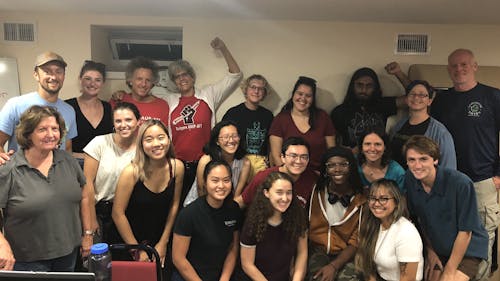Rutgers' endowment will consider more socially conscious investing in the future

Rutgers’ endowment, which has grown since 2012 to become worth more than $1 billion, is now considering whether to implement a stricter environmental, social and governance (ESG) investment criteria when making investment decisions.
While what will be added to the University’s ESG investment policy will not be decided until the end of the fiscal year, the University's endowment investments in fossil fuels — which total approximately 8 to 10% of the endowment — will become the subject of a student climate movement on campus this upcoming semester.
The University’s current standard for divesting in an individual business or sector is if it is an unequivocal University-view on an issue, said Tilak Lal, a member of the Board of Trustees and chair of the investment committee for Rutgers' endowment. For instance, the University divested from Sudan in 2006 after the crisis in Darfur, according to Rutgers' divestment policy advisory.
Accounting for approximately 1% of the University’s operating budget, the endowment serves a dual purpose to fund current programs and then to be there for perpetuity, as long as the University is around, Lal said.
The way an endowment donation works is, if someone wants to donate money for students from Middlesex County, that money is raised by the Rutgers University Foundation and is then given to the University’s investment office to be invested to support students of Middlesex County for as long as the University is around, said Jason MacDonald, the chief investment officer of the University’s endowment.
Approximately 60% of Rutgers' endowment is permanently restricted in scenarios such as the one MacDonald provided, and 43% of these restricted funds are dedicated to scholarships and fellowships, according to the endowment’s website.
“It is supposed to, and we take this very seriously, we sort of take this in a risk-aware way, like we would not take the point whatever million dollars in one stock, or all stocks,” Lal said.
To give an example of the endowment’s risk averseness, in 2008 the S&P 500 was down approximately 30% while, at the same time, the endowment was down approximately 15%, MacDonald said.
MacDonald’s position was created by the investment committee in 2016, when the endowment reached its $1 billion goal, Lal said. Now, MacDonald oversees an office of three employees and several student interns. With the approval of the investment committee, who answers to the Board of Governors and Trustees, MacDonald makes investments to ensure the approximately $1.33 billion endowment continues in perpetuity, Lal said.
The endowment for Fiscal Year 2018 was 9.3%, and its five-year improvement rate is 8%, MacDonald said.
“We have responsibility for all the discretion of the endowment whether it is investment or divestment,” Lal said.
Since 2015, when a student coalition first tried to get the University to divest in fossil fuels, Rutgers has put together a policy for evaluating divestment requests.
“The University and boards put together a working group that was broadly represented of the University group, students and faculty. I was a part of it, and they came up for that structure and process,” Lal said.
For groups looking to have Rutgers’ endowment divest in an individual business or economic sector, they would have to be evaluated by MacDonald and Lal. It would then be submitted to the boards who could form an ad-hoc committee similar to the one that created the policy and decide to divest or not, Lal said.
The Central Jersey Climate Coalition, a group led by Rutgers students, which also includes faculty and New Brunswick community members, is hoping to successfully convince the University to divest in fossil fuels, said James Boyle, a School of Arts and Sciences senior. Boyle expressed skepticism of the divestment policy in place.
“Essentially, this was a way for Rutgers to engage with student and faculty activists without actually fulfilling their demands. We will continue to pursue this request process as a coalition, but we understand the history and will not be sidelined by the bureaucratic machinations of the administration,” Boyle said.
Along with its divestment demand, the coalition is also fighting for the University to open an Office of Sustainability that will develop a climate action plan that will cut Rutgers' carbon neutral by 2030, Boyle said. The coalition plans on participating in the Global Climate Strike and Climate Action Week later this month.
Whether the University will completely divest from fossil fuels is something that will continue to be discussed and decided at a later date. Yet, MacDonald said the amount of investment is common compared to other University endowments. Oil and gas make up a total of 10% of the economy as well.
Still, the coalition is looking to make the change toward greener investments.
“We need substantive policies that prevent this from happening and align our investment practices with basic values and morals,” Boyle said.



